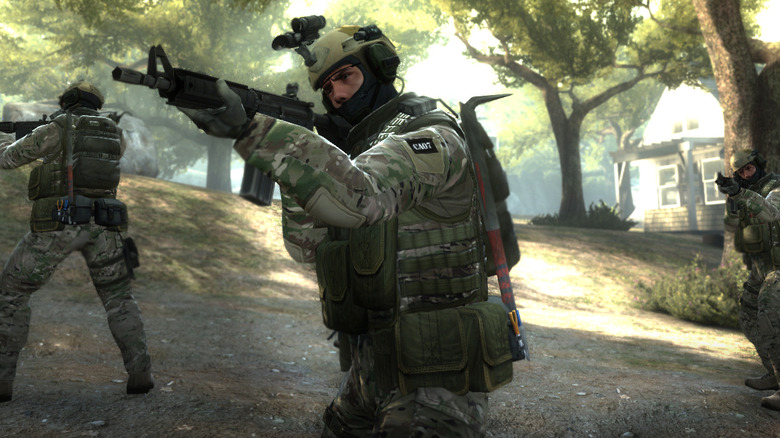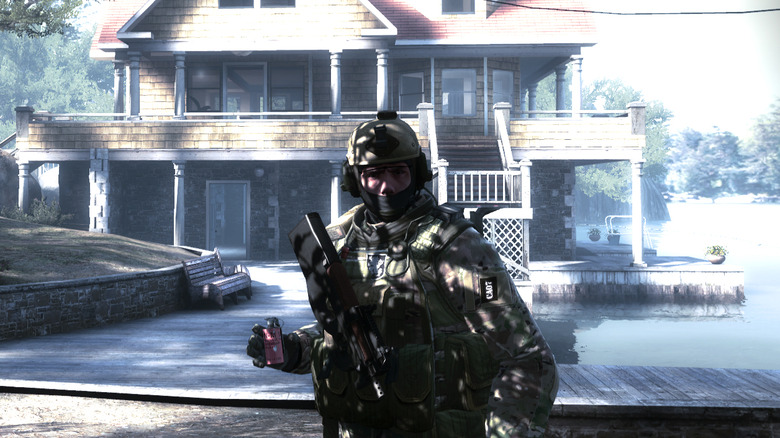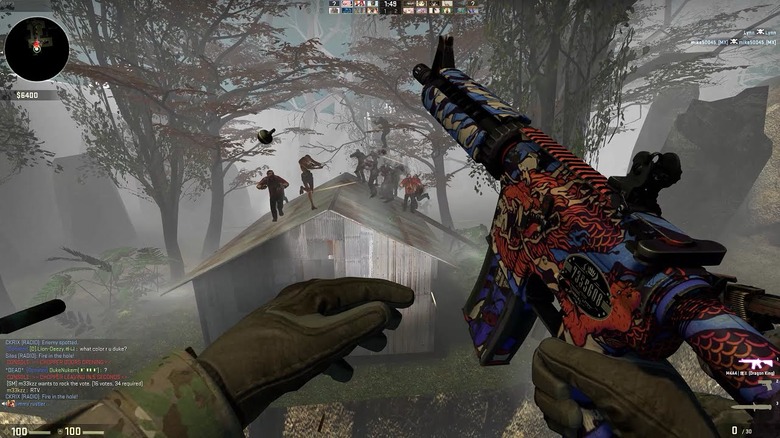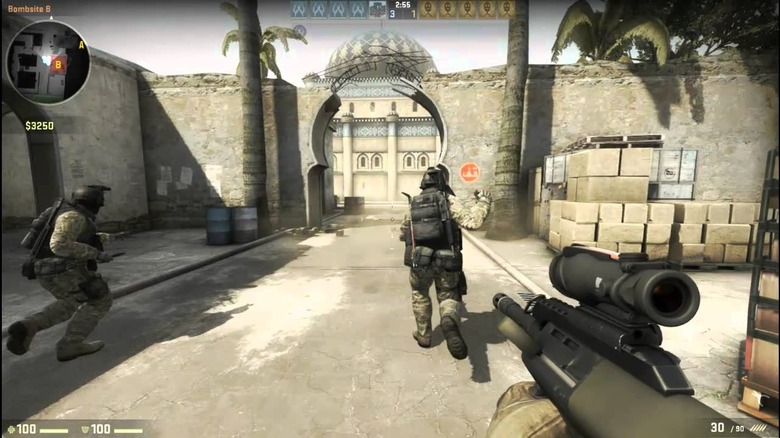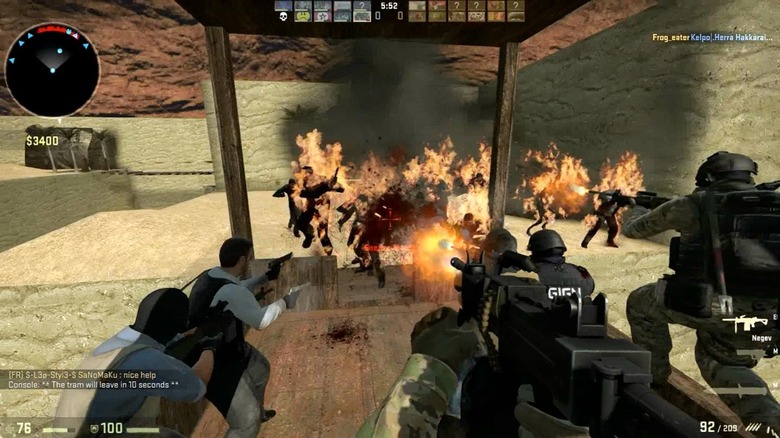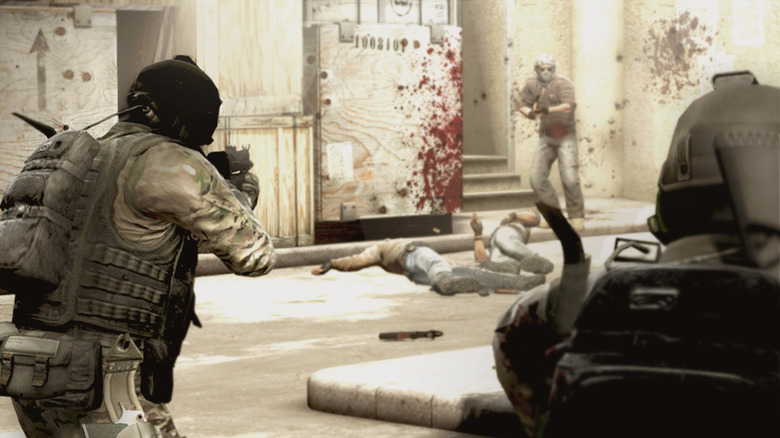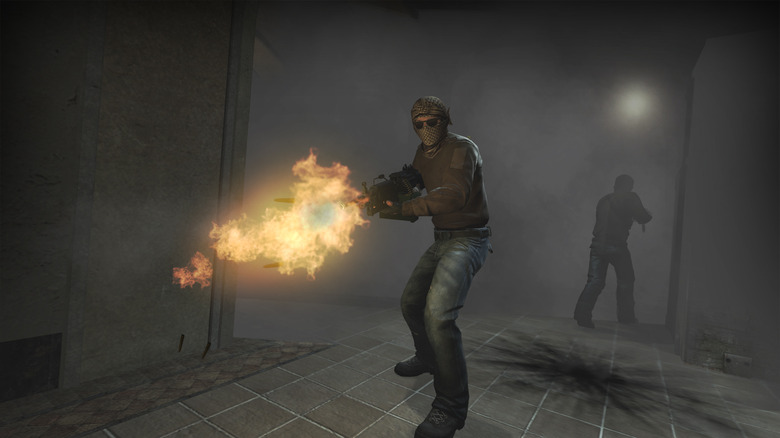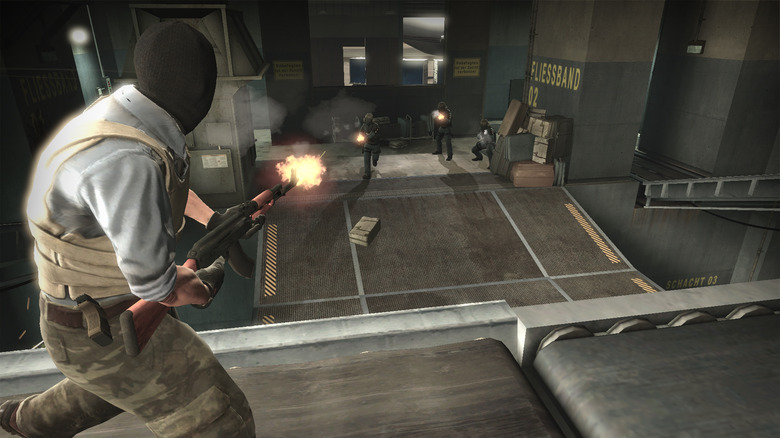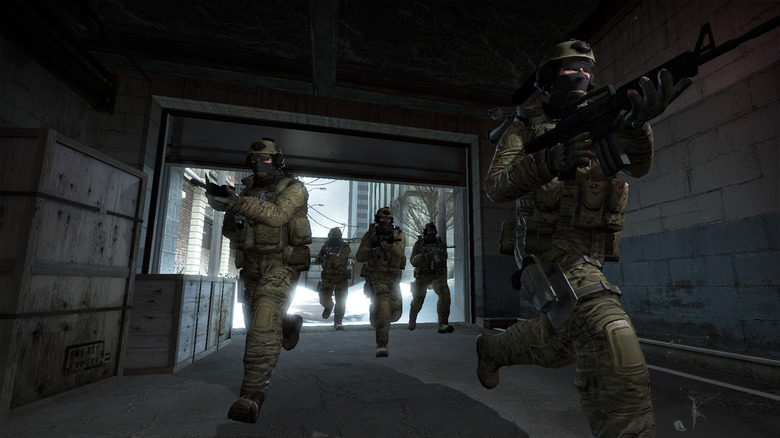Why Valve Won't Release A New Counter-Strike Game
Almost 20 years since its creation, the Counter-Strike series has remained one of the most popular competitive shooters on the market. Since its days as a mod for the original Half-Life, players have flocked to the title for its fast-paced, tactical action.
The setup for a match is quite simple: two teams face off on a map to complete objectives that include saving hostages, defusing bombs, capturing an area, or wiping out the enemy. One side plays as the Terrorists and the other team is the Counter-Terrorism squad tasked with bringing them down. That's all the backstory you need to jump into a game of Counter-Strike, as long as you also have the skills to back it up.
Counter-Strike: Global Offensive is the latest installment in the series in the West, but it's actually quite a few years old. Released in August 2012, the game now has a growing esports scene under its belt. That's remarkable for any shooter title, but can it be argued that CS:GO is getting a bit long in the tooth?
Some fans have been wondering if Valve will ever released another sequel, and while there have been rumors in the past, the studio hasn't announced a new Counter-Strike title. In fact, there are a few reasons why Valve might not be in much of a hurry to release a new sequel.
CS:GO still has great concurrent player numbers
Say what you will about Counter-Strike: Global Offensive's lifespan, a lot of people are still playing Valve's premier multiplayer shooter. According to Steam Charts, CS:GO still averages about 300,000 concurrent players per day as of this writing, meaning that an average of 300,000 people around the world are playing the game at a time. That puts CS:GO in second place (behind Dota 2) on the list of games with most concurrent players on Steam, a testament to just how popular Valve's shooter still is among its fan base.
With a player count as impressive as CS:GO's, it's not all that surprising that Valve isn't exactly desperate to work on a sequel. If tons of players are still playing the game, why rush a new title to market? It's possible that Valve might start thinking about what comes next once those numbers fall a bit more, but while it's in second place on Steam, it's unlikely that we'll see a new Counter-Strike game.
CS:GO is still making TONS of money
Steam is the gift that keeps on giving for Valve, which has prioritized the digital video game marketplace (not to mention Steam Machines and VR Vive headsets) over game development in the last few years. And who could blame them? After all, the platform earned Valve $4.3 billion in revenue in 2017.
Of note is the number of games that made most of that money. Steam offers over 21,000 games in its library, but only 100 of those titles make up half of that $4.3 billion. PlayerUnknown's Battlegrounds took the number one spot, with $600 million. In second place is none other than Counter-Strike: Global Offensive with $120 million.
With such a lucrative title on its hands, there's no reason for Valve to rock the boat with a sequel. Fans are clearly still happy to spend money on the current installment. Why take on the development costs of a new Counter-Strike when you can just keep making money on the current version?
CS:GO is still one of the most popular games on Twitch
Counter-Strike: Global Offensive's fan community is still a strong one. Gamers are not only happy to play the multiplayer shooter but also watch other competitors play, if the list of top Twitch games is any indication. As of this writing, CS:GO remains in the top ten of that list, typically featuring over 50,000 viewers across all of the Twitch channels broadcasting the game. On days of major esports competitions, it's not unusual to see CS:GO soar to the number one spot either.
Interestingly enough, CS:GO launched a little over a year after Twitch, which first hit the internet in June 2011. You could say that the two grew up together, allowing the game to become a staple of the streaming platform. With the growing esports viewership, ESL and ELEAGUE's official CS:GO channels have also helped bolster the game's popularity on Twitch.
Again, no one's exactly tired of CS:GO. Why replace it?
CS:GO is getting mainstream attention
Esports aren't just popular among gamers and writers who cover the scene. The near billion-dollar competitive gaming industry is slowly creeping its way into the mainstream. No longer is it the niche interest of a select group of people but a viable sport that is even being considered as an Olympic event, a stunning transition for esports in terms of cultural significance. As one of the most popular esports games, Counter-Strike: Global Offensive could be front and center at the Olympics someday soon.
You don't really need Twitch or YouTube to watch esports either. They're on TV now. TBS, the network owned by Turner, which created ELEAGUE, has been airing documentary series about esports for the last two years. The network's latest series is about the ELEAGUE Premier 2018 CS:GO pro tournament, bringing the world of Counter-Strike and many of its pro players to network television. The series started airing on August 31.
Now that CS:GO is getting mainstream attention, there's a chance it could reach a whole new audience and prolong the shooter's life.
Esports are really lucrative
This year, esports are projected to make $905 million in revenue, and the industry is predicted to cross the billion-dollar mark in 2019. By 2021, esports could be making about $1.65 billion, a major increase year after year. Yes, esports are a major cash cow, for both the leagues that put on the tournament and the companies that make the games.
Exciting competitions such as the ELEAGUE Major, with its $1 million prize pool, have kept CS:GO at the top echelon of the esports industry. While CS:GO is already doing very well for itself, there is a lot more money to be made if the esports industry continues the steady increase in revenue.
Valve, like any business, is interested in making as much money on its products as possible. If CS:GO revenue is trending upward, both through Steam sales and esports, the studio will hold onto the game until its made all the profit it can.
Valve makes so much money with Steam that it doesn't need ANY new games
Valve doesn't really need to work on new games to be profitable. Steam already makes the company tons of money. According to PCGamesN, in 2017, Valve made an estimated $4.3 billion off of Steam. That number doesn't even take DLC sales or microtransactions into account, meaning that Valve's total take last year was even more massive. Steam made up 18% of the digital PC gaming market revenue last year.
Add the profit Valve already makes off of Counter-Strike: Global Offensive and Dota 2, which are two of Steam's top sellers this year, and you have a company that doesn't really need another Counter-Strike game. Valve could continue to prioritize Steam to great success now that the service has pretty much become synonymous with digital PC gaming in the last few years. As long as that's the case, Valve isn't very likely to take on another massive project.
Sure, Valve announced that it's "making and shipping games again," but the company's first project is the collectible card game Artifact, which also happens to be an online game with a potentially very long lifespan. If Artifact becomes as financially successful as CS:GO and Dota 2, Valve could find itself sitting tight again for a few years.
Shooters are shifting to new trends
Then there's the shooter genre itself, which has changed quite a bit since Counter-Strike: Global Offensive first hit the scene in 2012. In this latest gaming generation, players have embraced new ways to enjoy shooting at each other. In fact, battle royale games and team-based hero shooters have taken the genre by storm and are even having an impact on esports.
Hero shooter Overwatch, for example, boasts more than 40 million players as well as an increasingly popular esport; the Overwatch League Grand Final was watched by almost 11 million people. Meanwhile, Fortnite, the most popular battle royale game currently on the market, has reached 125 million players and is making a big push into the esports market next year with the Fortnite World Cup.
In fact, so big is the battle royale craze that other traditional multiplayer shooters are pivoting. Call of Duty and Battlefield, two conventional shooter titles like Counter-Strike, are both launching battle royale modes this year. Should Valve decide to develop a new shooter title, it would probably at the very least consider these new trends. After all, Valve has followed trends in the past when deciding what to make next. It's why the company's current projects include a CCG and a few VR titles.
If battle royale games continue to grow in popularity, and their push into esports is successful, Valve's next shooter might not be Counter-Strike at all but something brand new.
Valve doesn't really care about popularity
As much as fans might want a new Counter-Strike, Valve isn't really known developing sequels based on their predecessor's popularity. Otherwise, Half-Life 3 and probably another sequel or two would be out by now. But as Game Informer reported in 2017, individual groups within Valve have tried to get a new Half-Life project off the ground several times but haven't really felt the need to follow through, choosing to work on other projects instead, such as Steam.
Valve could be following the same ethos when it comes to developing a new Counter-Strike game. People are asking for it, but that doesn't mean Valve is going to rush to make it.
"The only reason we'd go back and do like a super classic kind of product is if a whole bunch of people just internally at Valve said they wanted to do it and had a reasonable explanation for why," Valve president Gabe Newell told Game Awards creator Geoff Keighley during a podcast (via Polygon) in early 2018. While Newell was speaking in reference to Half-Life 3, this could also be true of Counter-Strike, another one of Valve's classic franchises.
CS:GO gambling and skin trading have been a huge problem
Despite the game's success, Counter-Strike: Global Offensive has also turned out to be quite the headache for Valve, which has had to combat illegal skin gambling and trading within the game. Over the years, both practices have become a big part of the game's community, creating a space, as Bloomberg reported in 2016, where teens can gamble skins (which are basically stand-ins for casino chips in this case, as pointed out by Kotaku) on the outcome of matches. This gambling operation has even led to pro CS:GO teams to fix the outcome of matches in major competitions.
In 2016, Valve sent out cease and desist notices to 23 Counter-Strike gambling sites in an effort to shut down the illegal market. The company didn't quite make it through this scandal unscathed, though. Valve faced several lawsuits as a result, as some argued that the company hadn't done enough to stop Counter-Strike gambling. (At least one of these class actions was thrown out.)
Needless to say, Valve might be hesitant to launch a new Counter-Strike game after all the trouble CS:GO has caused.
Valve is working on updating CS:GO with Source 2 instead
Counter-Strike: Global Offensive is reportedly receiving a rather massive update that could prolong the game's longevity. According to PCGamesN, Valve confirmed in 2017 that it was working on moving CS:GO to the Source 2 engine during a presentation for the game's Chinese market. One of the slides during the presentation teased the "brand new Source 2 engine and Panorama UI" for the game, as CS:GO prepared to launch in China. At the moment, CS:GO runs on Valve's aging original Source engine.
Valve hasn't said anything about the Source 2 update since, though. In fact, Valve hasn't even announced the Source 2 update for the North American market despite the fact that Dota 2 received a similar update in 2015. PC Gamer has pointed out a few ways the new Valve engine could improve the CS:GO experience:
"In addition to the presumed graphical optimizations of moving to the new engine, the content creation tools for new maps, new skins, etc. are allegedly a vast improvement over the original Source tools," PC Gamer explained. "Hopefully, this means we'll see a glut of new user-created content when the update drops, thanks to the modernized and more user-friendly creation tools."
All of this remains to be seen. For now, Valve continues to push Counter-Strike in its current form and there's no sign of that changing any time soon.



